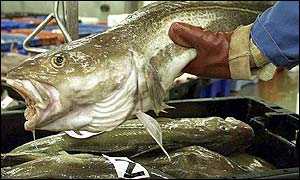|
BBC NEWS
Tuesday, 19 February, 2002, 10:26 GMT
Shoppers urged to shun endangered fish
Atlantic cod are endangered, conservationists warn
Conservationists are calling on shoppers to boycott 20 varieties of fish because of the impact of over-fishing on their numbers and the environment.
Traditional British favourites including cod, haddock, skate and tuna are all on the Marine Conservation Society's (MCS) list of vulnerable species.
It wants consumers to look for alternatives and has published a Good Fish Guide to help inform people about the varieties available in shops.
Bernadette Clarke, fisheries officer for the MCS, told BBC News Online that shoppers should look beyond price to think about whether the food they buy comes from a properly managed source.
She said the foot-and-mouth and BSE crises had an impact on consumer habits, adding: "I'm sure more people now are asking questions about the meat they eat, so there's a groundswell, we believe, in consumer interest about where the food they eat comes from."
Sustainable
The MCS guide has information on 60 species commonly on sale in Britain, how and where they were caught and whether they come from sustainable stocks.
Information on environmental and social issues associated with catching, processing and eating fish is also provided.
For many of the 20 fish named as a cause for concern, an alternative choice is named.
For example, MCS says over-fishing of cod in the Atlantic has depleted stocks and it recommends line-caught fish from Icelandic and Norwegian waters instead.
It says the number of Atlantic salmon has halved in the past 20 years and suggests buying organically farmed fish instead.
Other varieties are so endangered they should be taken off the menu for good, according to the MCS, including ling, Chilean seabass, snapper, monkfish, swordfish and shark.
Martha Holmes, BBC producer of the Blue Planet programme, who wrote the introduction to the guide, said: "The Good Fish Guide comes at a crucial time and has an important role to play in our lives.
"Many people are aware of the over-fishing problem, but would like to learn about the bigger picture and know how they can make a difference to consumers."
|
